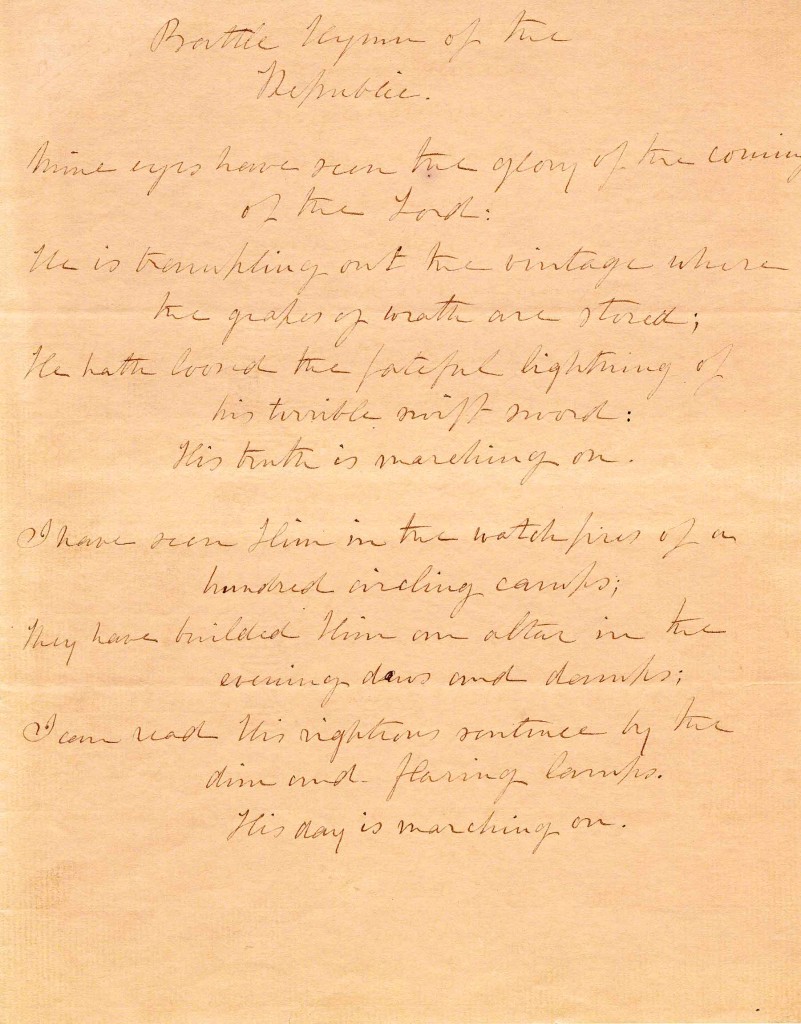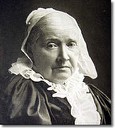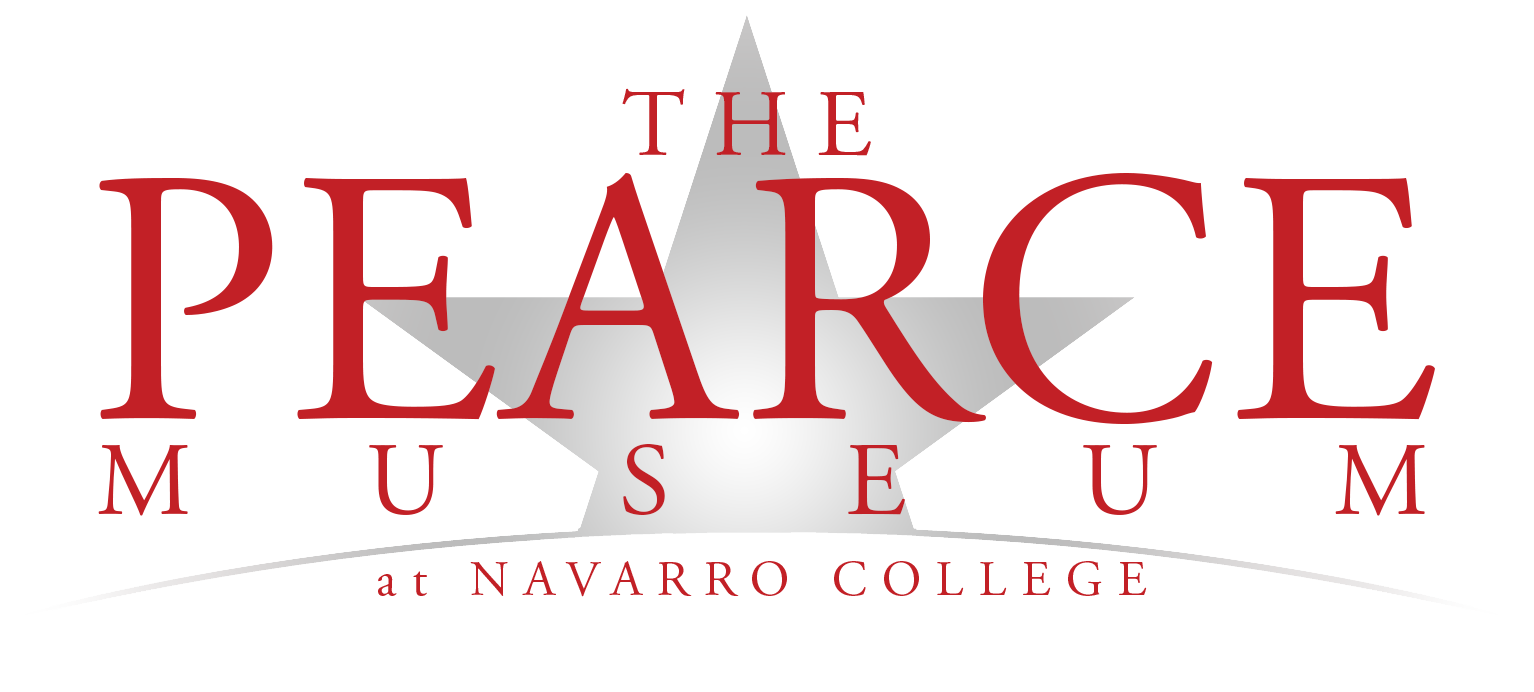Battle Hymn
Battle Hymn of the Republic
The words to the song “Battle Hymn of the Republic”? As first published, and as it is used now, are different. But both of those versions are different from the manuscript version that Julia Ward Howe first wrote in 1861. Her original manuscript included a final sixth verse.
BATTLE HYMN OF THE REPUBLIC
(First Published Version)
Mine eyes have seen the glory of the coming of the Lord;
He is trampling out he vintage where the grapes of the wrath are stored;
He hath loosed the fateful lightning of His terrible swift sword:
His truth is marching on.
(Chorus)
Glory, glory, hallelujah!
Glory, glory, hallelujah!
Glory, glory, hallelujah!
His truth is marching on.
I have seen Him in the watch-fires of hundred circling camps,
They have builded him an altar in the evening dews and damps;
I can read His righteous sentence by the dim and flaring lams:
His day is marching on.
I have read a fiery gospel writ in burnished rows of steel:
“As ye deal with my contemners, so with you my grace shalld deal”;
Let the Hero, born of woman, crush the serpent with his heel,
Since God is marching on.
(Chorus)
Glory, glory, hallelujah!
Glory, glory, hallelujah!
Glory, glory, hallelujah!
Since God is marching on.
He has sounded forth the trumpet that shall never call retreat;
He is sifting out the hearts of men before His judgment-seat;
Oh, be swift, my soul, to answer Him! Be jubilant, my feet!
Our God is marching on!
(Chorus)
Glory, glory, Hallelujah!
Glory, glory, Hallelujah!
Glory, glory, Hallelujah!
Our God is marching on
In the beauty of the Christ was born across the sea,
With a glory in his bosom tat transfigures you and me.
As HE died to make men holy, let us die to make men free,
While God is marching on.
(Chorus)
Glory, glory, hallelujah
Glory, glory, hallelujah
Glory, glory, hallelujah
While God is marching on.
He is coming like the glory of the morning on the wave,
He is Wisdom to the mighty, He is Succour to the brave,
So the world shall be His fottstoll, and the soulf of Time His slave,
Our God is marching on
(Chorus)
Glory, glory, hallelujah
Glory, glory, hallelujah
Glory, glory, hallelujah!
Our God is marching on.
Scanned Copy of Battle Hymn of the Republic
This transcription was copied from the original document and is representative of all spelling, punctuation, and grammar as written by the creator. The original document is housed in the Pearce Civil War Collection, Pearce Collections Museum, Navarro College, Corsicana, Texas. https://www.PearceMuseum.com

Battle Hymn of the Republic
Possible Meaning of the Battle of the Republic
“the coming of the Lord”
Mrs. Howe’s eyes saw nothing of “the coming of the Lord” because the Lord had not come. As a Unitarian in Boston in 1861, she probably did not even believe in the physical, bodily return of Christ to this earth. This was her “interpretation” of the second advent: the Union army pouring out divine grapes of wrath on the Confederacy.
“hundred circling camps”
The “hundred circling camps” were the Union Army camps that Mrs. Howe toured at President Lincoln’s invitation. She actually imagined the watch-fires of the camp to be alters built to God? “By the dim and flaring lams” in the camps, she was able to read God’s “righteous sentence” on the South .
I have read a fiery gospel writ in burnished rows of steel:
“As ye deal with my contemners, so with you my grace shall deal; Let the Hero, born of woman, crush the serpent with His heel, Since God is marching on.”
This is the verse conveniently left out of every hymnal that prints “Battle Hymn of the Republic.”
According to Mrs. Howe, the “fiery gospel: is written and spread by “burnished rows of steel” – by rifles and bayonets
The word “contemner” is not often used today. It means one who commits contempt. The verb “contemn” means to view or regard with disdain, scorn, or contemp; to despise.
The Southern Confederacy is here viewed as having contempt for God. Therefore, to the extent that the Union Army deals with God’s contemners in the South, to that same extent, according to Mrs. Howe, God will shed his grace on the Northern soldiers.
He has sounded forth the trumpet that shall never call retreat;
He is sifting out the hearts of men before His judgment set:
Oh, be swift, my soul, to answer Him! Be jubilant, my feet!
Our God is marching on.
Here Mrs. Howe depicts the choice made by her contemporaries between the cause of the South as God “sifting our the hearts of men’. She implies that God is sitting on a judgment seat “sifting” men. But, compare the lives of the north (Grant and Sherman) and south (Lee and Jackson) leaders. The Southern Army had devout and Godly men, such as Lee and Jackson. They did not allow their soldiers to curse, they held Sunday services, and they held prayer meetings in their camps.
In the beauty of the lilies Christ was born across the sea,
With a glory in His bosom that transfigures you and me:
As HE died to make men holy, let us die to make men free,
While God is marching on.
This verse is the true purpose of this song: “As He died to make men holy, let us die to make men free.” This song is written to inspire the Union soldiers who were facing death in their effort to execute Lincoln’s war of aggression against the Southern Confederacy.
Abolitionism comes out in the phrase, “make men free.” That is the way Mrs. Howe, as an Abolitionist, wanted to portray the goal of the War – to end slavery
QUESTIONS:
- Do you agree with this interpretation? Write additional notes or disagreements on the provided hymn.
- Mrs. Howe’s original writing included six verses. Why do you think it was later omitted?
- General Sherman demonstrated the following actions with his troops: directed the march to the sea,” destroyed crops, farms, burned civilians houses, and deliberately executed a scorched-each policy destruction. Give your explanation of the reason Mrs. Howe was devoutly on the side of the north.
- Abraham Lincoln had rejected the South’s defense of secession and refused to free the slaves. He stated,
“My paramount object in this struggle is to save the Union, and is not either to save or to destroy slavery. If I could save the Union without freeing any slave I would do it, and if I could save it by freeing all the slaves I would do it; and if I could save it by freeing some and leaving others alone I would also do that. What I do about slavery, and the colored race, I do because I believe it helps to save the Union; and what I forbear, I forebear because I do not believe it would help to save the Union.”Lincoln wanted to keep Northern conservatives and a few pro-slavery border states on his side. Julia Ward Howe framed the war within her hymn and gave the fighting men a godly and ethereal spark. What other events or wars has been swayed by song, speech, or motto?
Julia Ward Howe

Julia Ward Howe
Julia Ward Howe was born in New York City on May 27, 1819. Her father was a Wall Street stockbroker, banker, and strict Calvinist. Her mother was a poet who died of tuberculosis when Julia was five. She was educated by private tutors and schools for young ladies until she was sixteen. She became very well read. Julia Ward met Samuel Gridley Howe, a physician and reformer who founded the Perkins School for the Blind. They married in 1843 and had six children. She published several books of poems and plays. Many of the discussed critiques of women’s roles as wives, her own marriage and women’s place in society. Julia believed it was right to free slaves but did not believe in racial equality. She was inspired to write “Battle Hymn of the Republic” after she and her husband visited Washington D.C., and met Abraham Lincoln at the White House in November 1861. She wrote new words to the song “John Brown’s Body”. It quickly became one of the most popular songs of the Union during the American Civil War. Howe’s most significant accomplishments were her contributions to women’s rights. She laid the foundation for women’s rights groups both in her own home and in the public eye. Howe died of pneumonia October 17, 1910.

